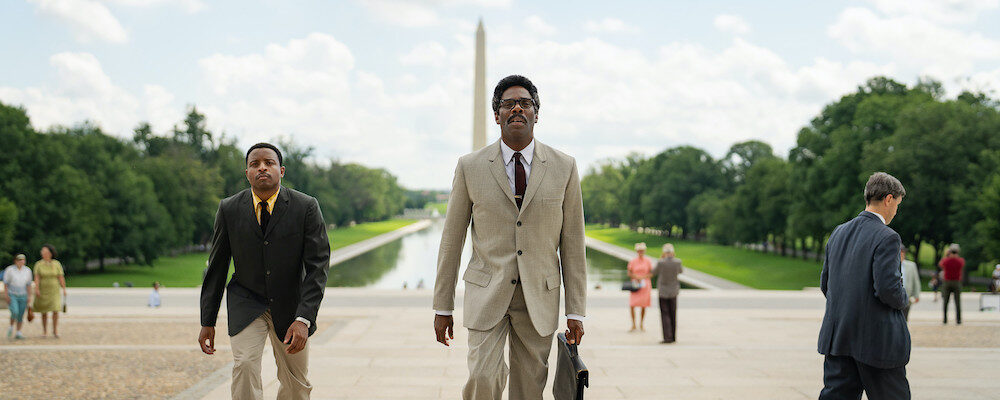‘Rustin’: Colman Domingo Is a Powerhouse as Unsung Civil Rights Hero Bayard Rustin
Alci Rengifo
Great historical events always feature those unsung heroes standing in the background, who oftentimes had more to do with what happened than the famous lead players. One such figure is Bayard Rustin, the gay civil rights activist who organized the 1963 March on Washington for Jobs and Freedom where Martin Luther King Jr. delivered his immortal “I Have a Dream” speech. As the first narrative feature from Barack and Michelle Obama’s production company Higher Ground, “Rustin” gives the eloquent firebrand his due, with a stirring performance by Colman Domingo that might just be the actor’s best. Domingo is so unforgettable and vivid in bringing Rustin to life, that the film thrives on his very presence. He is the story here even as director George C. Wolfe, who also made the stark and illuminating “Ma Rainey’s Black Bottom,” manages to incorporate rich layers of political and social commentary.
The film begins in 1960 when Rustin and other activists are pushing King (Aml Ameen) to lead a great march on the Democratic National Convention. Such an event will send a clear message to front-runner John F. Kennedy and the party that Black Americans will not abide by them ignoring segregation. When King agrees, it angers the head of the NAACP, Roy Wilkins (Chris Rock) and U.S. Representative for Harlem, Adam Clayton Powell Jr. (Jeffrey Wright). A malicious campaign begins to spread innuendo about Rustin’s gay identity and he’s soon forced out of the NAACP. When 1963 rolls around, Rustin is stuck at a job he hates but still organizes for the movement. He works with assistant and sometimes lover Tom (Gus Halper) and soon pushes for another march, this time on Washington, D.C. culminating with surrounding the White House. The big question is if Rustin can mend his rift with King and unite to truly help make the march massive and historic.
As portrayed by Domingo, Rustin is both an absorbing character and channel for various elements of the civil rights struggle. Rarely do films dive into the various factions of such historical moments. While the movie itself is never directed like a radical statement, Wolfe still explores the debates between radicals and mere liberals. At a party Rustin confronts eager admirers of Malcolm X who believe pacifism is nonsense. The movie avoids using the word, but in real life Rustin was a gay socialist who believed class struggle was important within the fight for racial equality. He also admired Gandhi’s tactics and believed all these ideas could harmonize. The film is more critical of the Black bureaucrats who quickly want to tame any calls for action. Chris Rock’s Roy Wilkins is the typical, cautious political operator who has to be pushed into finally supporting big ideas. A man in office like Powell Jr. (played with a raging ego by Jeffrey Wright) is even harder to communicate with since he needs to protect his cushy seat. He is also cutthroat enough to threaten Rustin with knowledge of his sexual identity.
While the screenplay by Julian Breece and Dustin Lance Black energetically captures all the details of the eventual planning of the march, its logistics and guests, it provides more space for Rustin as a person. Domingo is on fire with this role, playing a cultured man driven by the passion of fighting injustice. He can inspire the masses and in private reveal he plays the lute. Friends tell him he has a charm and charisma even King can’t match. But Rustin’s personal life is as complicated as any political battle. A handsome young pastor in the NAACP, Elias Taylor (Johnny Ramey) catches Rustin’s eye and they frequent a gay bar, sleep together and risk exposure. Elias also happens to be married to the daughter of a minister whose large church he might inherit, so painful choices have to be made. As Rustin fights against racism, he also belongs to another community also facing violence and terrible prejudice.
“Rustin” is not a long movie by Netflix standards, clocking in at 1 hour and 46 minutes. Because of Domingo, who surely deserves awards recognition, it feels over in a flash. You could easily argue it deserved a bit more. Once the march takes place the movie quickly turns into more of a feel-good TV drama, with a quick run through of stirring music to shots of everyone marching and King delivering some of his historic speech. Wolfe knows we’re so familiar with the images of the event that he seems to just want to get past them. More engaging are the scenes involving real political and personal battles. At its best it doesn’t go for the romanticized views of history. When Kennedy delivers his famous address to the nation on civil rights following the march met with police dogs and firehoses in Birmingham, Rustin feels it’s too tame of a response. It’s important to remember King himself would be abandoned by some when he decided to speak out against the Vietnam War in the late ‘60s, just before his assassination. A key point in “Rustin” is that radical stances require special courage because they’re not always the popular choice, even among supposedly progressive forces. Domingo delivers one of the year’s best performances as a man who fought public and private battles on multiple fronts.
“Rustin” begins streaming Nov. 17 on Netflix.

